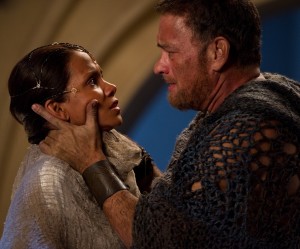‘Cloud Atlas’: A Sextet of Shoddy Storytelling
It’s hard enough to make one movie that’s consistently engaging and worthwhile, let alone a half-dozen of them. If nothing else, the makers of the sprawling piece of saccharine Cloud Atlas get credit for having six pipe dreams all at once.
The actions and decisions of the people of the past can have positive and negative long-reaching outcomes in the future. Every good turn can mean hope for the world, such as the instance of an American lawyer (Jim Sturgess) learning to fight the injustice of slavery in the 1840s. Transgressions will come back to haunt you, a lesson learned by a modern-day book publisher (Jim Broadbent) who gets greedy with his latest project and becomes imprisoned as a result. Standing up for what you believe is right does not come easy, whether you’re a 1970s journalist (Halle Berry) investigating the story of a lifetime or a genetically-altered life form (Doona Bae) in the 22nd century questioning her existence for the first time. An inescapable truth is that the motivation of love is all that matters, from a gay musical composer (Ben Whishaw) in 1930s England struggling to create a masterpiece to a member (Tom Hanks) of a primitive tribe living years after the downfall of civilization fighting for what few people of his clan still survive. No matter the details of your lot in life, everything in this universe is connected.
With so many characters and such a finite cast, it’s hard to know where to start in analyzing actors when there is no true star here. Most eyes will go to Hanks as the biggest name attached, with his main role that of tribal shepherd Zachry, who speaks in a pidgin dialect that makes Forrest Gump sound like the intellectual equivalent of William F. Buckley or H.L. Mencken. Apparently, in the world of 2321, these people aren’t even on the lowest rung of the evolutionary ladder, in constant battle with a race of savage nomads known as the Kona, yet living in fear of an advanced society. Berry plays off Hanks well enough as the sentry from this upper culture who needs Zachry’s assistance in seeking out other survivors. Likewise, the two function well in the ’70s tale of reporter Luisa Rey, she as the muckraker looking into a new nuclear power plant and he a scientist helping her in her process.
It’s much more intriguing to see Hanks play against type as a foul-mouthed gangster author in 2012 who doesn’t take criticism well to say the least. Broadbent is expectedly buffoonish as his overextended editor, stuck in an abusive nursing home while on the lam, though the actor is just as at home playing renowned classical composer Vyvyan Ayrs, whose age requires him to hire a younger talent to transcribe his genius onto sheet music, namely Whishaw’s Robert Frobisher, who is more than happy to live in the lap of luxury temporarily, though the experience opens his eyes to the tumult of pre-World War II Europe. Sturgess is alright but nothing special as naïve, ailing attorney Adam Ewing, tasked with helping a slave (David Gyasi) returning from a Pacific colony. Conversely, Korean actress Bae is a revelation as Sonmi-451, one of hundreds of clones created to labor in futuristic metropolis Neo Seoul, who thinks outside the box simply by virtue of thinking at all when she seeks out a life of her own. Kudos to her, but almost everything else about her story feels wrong.
No matter how you present it, there’s something off about any movie that tries to pass off white actors as any other ethnicity, most noticeable with Sturgess, Hugo Weaving, and other cast members in slant-eyed makeup that’s hardly any improvement over Marlon Brando in The Teahouse of the August Moon or Mickey Rooney in Breakfast at Tiffany’s. Having Berry in whiteface as Ayrs’ Jewish wife, or Hugh Grant under every color of the rainbow as a Kona chief, isn’t any better. In that same line of thought, is it necessary to have men playing women and vice-versa? The answer the film gives us, or at least insinuates, is that the reincarnation is alive and well, obliging every actor to play multiple roles no matter what the color of their skin. More often than not, these seemingly seamless portrayals are cumbersome with most characters added just so Hanks, Berry, Broadbent, Sturgess and the rest, can be featured in every interlocking chapter. Co-writers/directors the Wachowski siblings and Tom Tykwer give us six stories that are each absorbing on their own, but all strung together with about 10 minutes at a time devoted to each segment, these seem so much less impressive. David Mitchell’s bestseller may have been able to keep readers’ attention, but a multi-point narrative that works in book form rarely comes out well on the big screen. They can create stunning, layered worlds certainly, but each of the six lacks the full-bodied feel they need to succeed. OK, a handful of short, compact episodes aren’t going to have the same weight as one big single story, but altogether this collection has the consistency of cotton candy, and while some may love the taste, others may gag.
The six stories of Cloud Atlas function as a cluster of electrons swirling a nucleic moral of “what goes around comes around” and the like. Since we already learned The Golden Rule in kindergarten, what’s the point of it all? Tykwer and the Wachowskis take something relatively simple and make it infinitely more convoluted than it needs to be until it’s barely watchable. Even the novelty of Weaving in drag can’t make up for that.
Rating: 1.5 out of 4 stars


